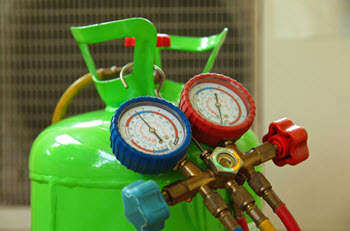Does Your AC Use R-22 Refrigerant? Here’s What You Should Consider
 If you want a cool home, then nothing beats a central air conditioning system to do away with the extreme heat and humidity of summer. The problem is when an HVAC system malfunctions during the summer, and if it is a 15-year+ system, homeowners have to pull up their socks and make a big decision — do we repair or replace? The reason is due to the federal government’s mandatory R-22 phaseout that finalized on January of 2020. In other words, air conditioning systems that work with R-22 refrigerant will have to decide whether to repair their old unit or to put these older models to rest.
If you want a cool home, then nothing beats a central air conditioning system to do away with the extreme heat and humidity of summer. The problem is when an HVAC system malfunctions during the summer, and if it is a 15-year+ system, homeowners have to pull up their socks and make a big decision — do we repair or replace? The reason is due to the federal government’s mandatory R-22 phaseout that finalized on January of 2020. In other words, air conditioning systems that work with R-22 refrigerant will have to decide whether to repair their old unit or to put these older models to rest.
The Total Ban Of R-22 Production & Importation In The United States
Contents
- The Total Ban Of R-22 Production & Importation In The United States
- Does R22 Continue To Be Available In New Jersey?
- Reasons Behind The Production Of R22: Environmental Damage
- Comparing The Energy Efficiency Of R22 And R410a: What’s The Better Choice?
- The Cost Per Pound Of R22 Refrigerant: Why Is R-22 Refrigerant Price So Costly?
- Central AC Prices: HVAC Tax Credits
- Conclusion
R-22 is the cooling substance used in older air conditioning systems. This refrigerant used to be the standard. It effectively enabled HVAC systems to remove the indoor heat and pump it outdoors. Over time, because of its negative impact on the environment, it has become unfavorable. That, combined with government regulations, has left the HVAC industry scrambling to develop better units and products that are safer for the environment. That said, January 1, 2020 was the deadline for importing and making the controversial R-22 refrigerant in the United States.
Does R22 Continue To Be Available In New Jersey?
The answer is yes. And, it will continue to be available. However, due to its large demand and limited supplies, the costlier it will be to recharge your AC unit with R22 refrigerant.
So, that leaves homeowners wondering whether these ridiculous recharging costs for their older central cooling units are better than an upgrade to a modern and more energy-efficient air conditioning unit. You can call Point Bay Fuel for a free assessment and cost analysis for your cooling system today!
Essentially, all homeowners need to understand is that as of January 1, 2020, R-22 refrigerant was no longer as readily available as it was before. That means, should your air conditioning system require a recharge this summer, the only thing you’ll be able to do is to pay high R22 refrigerant prices or replace the HVAC system.
Reasons Behind The Production Of R22: Environmental Damage
 The obvious reason that the government banned the production and importation of R22 is the negative impact it caused on the environment. R-22 refrigerant has HCFCs or hydrochlorofluorocarbons[1] which destroy the ozone layer. That’s a massive problem for the planet because that leaves us vulnerable to the dangerous ultraviolet rays and radiation from the sun. Though we have caused a great deal of damage to the ozone layer, it did shrink over time after HCFCs and other ozone-depleting substances were banned in some countries around the world.[2] Therefore, you have two reasons to switch from an older air conditioning system that functions with R22 refrigerant – you’ll save money in the long run, and you’ll use a safer system for the environment since modern AC units use Puron (R-410a).
The obvious reason that the government banned the production and importation of R22 is the negative impact it caused on the environment. R-22 refrigerant has HCFCs or hydrochlorofluorocarbons[1] which destroy the ozone layer. That’s a massive problem for the planet because that leaves us vulnerable to the dangerous ultraviolet rays and radiation from the sun. Though we have caused a great deal of damage to the ozone layer, it did shrink over time after HCFCs and other ozone-depleting substances were banned in some countries around the world.[2] Therefore, you have two reasons to switch from an older air conditioning system that functions with R22 refrigerant – you’ll save money in the long run, and you’ll use a safer system for the environment since modern AC units use Puron (R-410a).
Comparing The Energy Efficiency Of R22 And R410a: What’s The Better Choice?
Differences Between R-22 Refrigerant & R-410a
As an HVAC system ages, its efficiency naturally deteriorates. Over time, dust and debris end up accumulating on all the surfaces. Eventually, friction causes wear and tear. With time, cracks and leaks can develop as pressure builds up in the system. Of course, older air conditioning systems can still function and cool homes. However, they do so by using much more energy than they did when they were brand-new. So, by using more power, that also increases costs with regards to your HVAC repair costs and energy bills. Considering these arguments, doesn’t it make more sense financially to purchase a newer model that’s more cost-efficient?
Additionally, there have been many advancements made with regards to technology related to heating and cooling systems, making them extremely energy-efficient. Therefore, comparing everything involved with an air conditioning system, one that’s 15 years old or more, or one that is brand-new, it’s obvious to see the superiority of the newer, energy-efficient unit. It just makes much more sense to choose a new system, when considering the degradation of efficiency and normal wear and tear of an older unit.
The Cost Per Pound Of R22 Refrigerant: Why Is R-22 Refrigerant Price So Costly?
 Although R22 is currently still available, R-22 refrigerant price is literally through the roof. That’s because it has been phased out over several years, discouraging manufacturers from continuing to make the refrigerant. Combining the high demand and low supply of R-22, it continues to push R-22 refrigerant price upwards since there is still a market for it among property owners with older systems. There will not be any relief in sight, and instead, the prices of R22 will continue to climb due to the increasingly dwindling supply.
Although R22 is currently still available, R-22 refrigerant price is literally through the roof. That’s because it has been phased out over several years, discouraging manufacturers from continuing to make the refrigerant. Combining the high demand and low supply of R-22, it continues to push R-22 refrigerant price upwards since there is still a market for it among property owners with older systems. There will not be any relief in sight, and instead, the prices of R22 will continue to climb due to the increasingly dwindling supply.
Should your refrigerant leak or fall below certain levels, you’ll be dealing with an extremely large and unpleasant air conditioner repair bill. Furthermore, experts in the field claim that R-22 pricing will steadily increase as its supply dwindles even further. This should not come as a surprise considering it follows the economic model of price determination of supply and demand.
Central AC Prices: HVAC Tax Credits
The government has offered various perks to consumers to encourage property owners to switch from old cooling systems to newer, environmentally-friendlier air conditioners. Property owners will be able to benefit from significant tax breaks that will help them offset the costs of their newer cooling system. The Air Conditioning Contractors of America or ACCA can help you with those calculations.
The savings related to the upgrade of an air-conditioning system has to do with what’s known as SEER, or the Seasonal Energy Efficiency Ratio. You can expect to save more when you choose a higher rating in the form of different incentives, from rebates to tax credits. Not only do you benefit from lowered prices when upgrading to a newer model, but the better the SEER ratings, the lower your cost to run the equipment, so you’ll get a cooler home for much less.
It’s similar to a car and the mpg that it gets. You’ll get more comfort for less. Today’s best air conditioners use 30% to 50% less energy to produce the same amount of cooling as air conditioners made in the mid-1970s. Even if your air conditioner is only 10 years old, you may save 20% to 40% of your cooling energy costs by replacing it with a newer, more efficient model.[3]
For more information on the tax breaks and other savings regarding HVAC upgrades in New Jersey, contact Point Bay Fuel. You can call us at (732) 349-5059 today to make an appointment for free HVAC assessment.

Conclusion
Point Bay Fuel, a reputable HVAC service company, can provide you with exceptional and affordable HVAC services for your property. We take pride in our heating and cooling services, installations, repairs, and maintenance.
We do all we can to provide a friendly service and affordable prices to satisfy our customers.
Contact Point Bay Fuel to learn more about our services and systems today! One of our professionals will be able to meet you and provide a free, in-home consultation. No matter what your concerns, we’ll find the best solutions for your air conditioning needs. Whatever the question, we’ve got the answer. Call us now!
Take advantage of our free, in-home estimates. Call our office to schedule an appointment. Click here to contact us now or call us at (732) 349-5059 to speak to one of our home comfort specialists!
[1] Phaseout of Ozone-Depleting Substances (ODS) (https://www.epa.gov/ods-phaseout)
[2] Ozone depletion, explained (https://www.nationalgeographic.com/environment/global-warming/ozone-depletion/)
[3] US Department of Energy (https://www.energy.gov/energysaver/central-air-conditioning)
